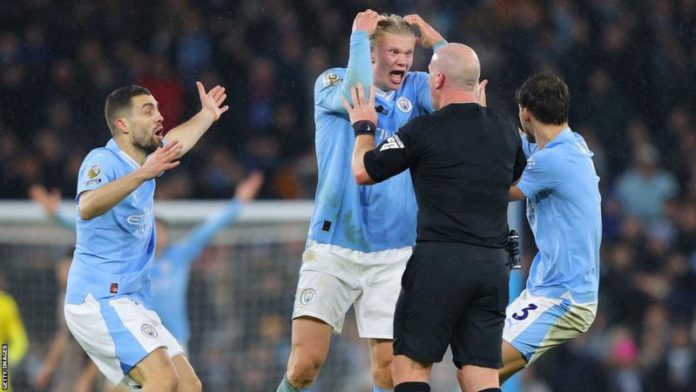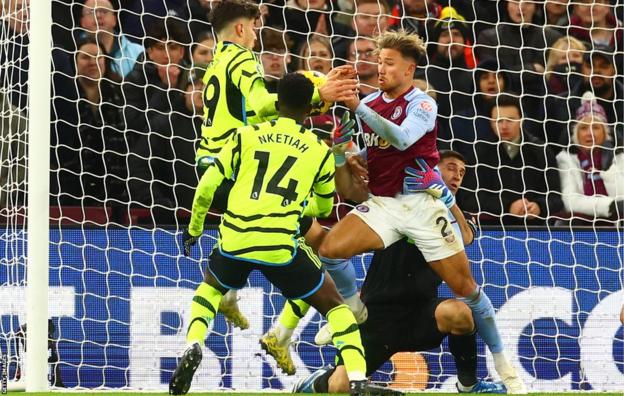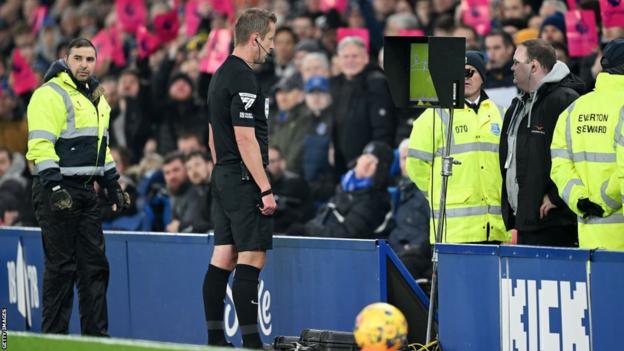
Simon Hooper “was devastated” after not giving Manchester City a late advantage in their Premier League draw with Spurs, according to Howard Webb.
Referee Hooper awarded a free-kick to City in added time, just when it looked like Jack Grealish was through on goal.
The official initially waved play on when Erling Haaland was fouled by Emerson Royal, but he halted the match once the through ball was played.
“I understand the disappointment that City felt on this one,” said Webb.
Webb, the 2010 World Cup final referee, is chief refereeing officer at Professional Game Match Officials Limited (PGMOL), which manages elite officials in England.
The Football Association charged City with failing to control their players in the aftermath of the incident in the 3-3 draw on December 3.
Norway forward Haaland was one of several City players to remonstrate with Hooper. He continued his protests after the final whistle, reposting a clip of the incident on X, formerly Twitter, with the comment “Wtf”, which is offensive slang.
The decision also attracted considerable criticism from pundits.
Speaking on Match Officials Mic’d Up, a Premier League Productions programme which analyses key decisions in recent matches, Webb understood the frustration.
“It is an officiating mistake and the VAR has no part to play in this,” Webb said.
“We’re always looking, as officials, to have that positive influence on the game, by trying to identify occasions when we can allow the game to play through an advantage.
“He decides to penalise just at the moment as the ball’s about to go, he blows the whistle, and then realises that a wonderful advantage was available.
“He was devastated. He’d refereed the game really well for 93 minutes, but he knew this is going to be the only talking point. It would have been a wonderful advantage.”
Webb also addressed significant talking points from other recent Premier League games…
Aston Villa 1-0 Arsenal – Havertz’s handball (9 December)

Arsenal thought they had salvaged a point late on against Aston Villa when Kai Havertz competed with home defender Matty Cash at the back post and bundled in from close range.
However, his effort was disallowed for handball by referee Jared Gillett with VAR used to confirm the decision.
The result meant the Gunners slipped off the top of the table and manager Mikel Arteta appeared frustrated in his post-match interview, although he refused to comment on the incident other than saying “clear and obvious”, terms that have been frequently associated with VAR.
“The law states that any contact with an attacker’s hand or arm – even accidental – which then leads to a goal being scored immediately has to be penalised,” said Webb.
“You’re not alone in not liking this particular law, but this is actually a really good on-field decision by the referee, in that respect. The law requires him to penalise when he sees that contact on Havertz’s arm.
“It’s not intentional, but it still has to be penalised. I think the idea was that if it comes off the arm, it can’t be a fair goal – that was the reason why this law came in.
“It was decided by the International Football Association Board [Ifab]. The laws are always under review, maybe it will change, but in this circumstance, the referee did absolutely the right thing.”
Everton 0-3 Man Utd – Booking overturned and penalty given (26 November)

Also in the programme, full audio from the VAR team was played for the build-up to Manchester United’s second goal at Everton.
United forward Anthony Martial initially received a yellow card for diving inside the penalty area.
However, that was rescinded and the visitors were awarded a penalty after the VAR recommended that referee John Brooks carried out an on-field review of a challengeon the Frenchman by Everton defender Ashley Young.
“We see that the referee issues a yellow card for simulation to Martial, saying in his opinion, he’s gone down without contact because Young’s come back, and the video shows something quite different,” said Webb.
“In our opinion, this is a good use of VAR to rectify a clearly wrong on-field judgement. You’re trying to look at the actions of the defender – does the defender play the ball? Does the attacker find the leg by deviating their path?
“All that has to be done in that moment, and that’s the reason we’ve got VAR – so we can have another look at it.”
Crystal Palace 1-2 Liverpool – penalty awarded after review (9 December)
Another decision reviewed on Mic’d Up was a penalty awarded to Crystal Palace when French striker Jean-Philippe Mateta was caught by Liverpool defender Jarell Quansah in the 18-yard box.
Referee Andy Madley initially allowed play to continue, believing there was insufficient contact to give the spot-kick. After a VAR review, Madley went to the on-pitch monitor and elected to award a penalty to the hosts.
“I think that’s a very clear penalty-kick situation,” Webb said.
“It was not seen by the on-field referee in real time, and the VAR’s there to check for that significant contact by Quansah into the back of Mateta, who’s the only one to touch the ball.
“As the game’s continuing, the VAR is checking the angles available to see if there is that clear and obvious error, and recognises that there is one.
“I think a better way to do this would be to stop the game at that moment, as soon as the VARs recognise that a review is going to be needed for the penalty.
“That stops anything else happening in the game, it gets us away from this feeling that it’s taking a long time to check this. I think, going forward, that’s what we’d rather see – the game being stopped as soon as VAR identifies a review is needed.”
There was no analysis in the programme of an earlier penalty decision that went against Palace when the official took three minutes to review a challenge by Will Hughes on Wataru Endo in the lead-up to Virgil van Dijk’s foul on Odsonne Edouard inside the box.
The decision to dismiss Palace forward Jordan Ayew for a second bookable offence while the Eagles were 1-0 up was criticised by Roy Hodgson but was also not discussed.






